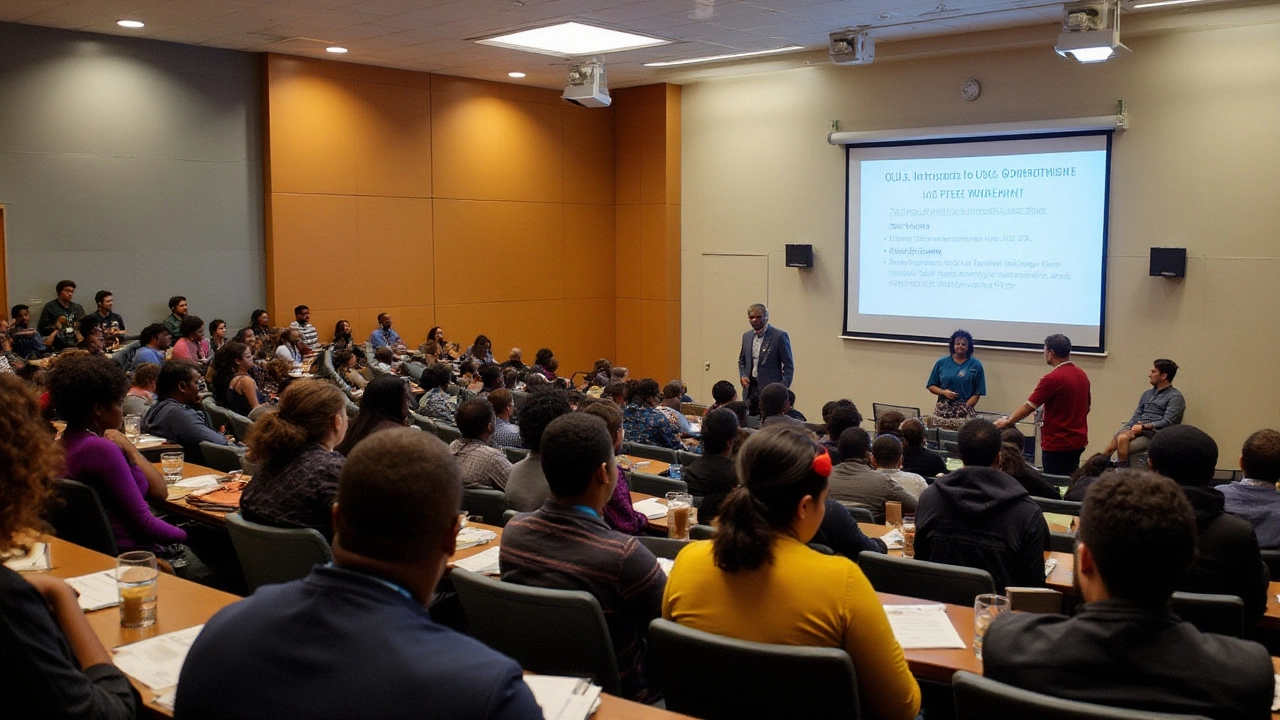Getting hired by the US government is a dream for many, offering not just stability but also a chance to contribute to national progress. While the federal job market is competitive, understanding the intricacies of the process gives you a significant edge.
A federal career can span many sectors, like foreign affairs, technology, public safety, and more. It’s essential to grasp what different roles entail and the qualifications needed. By doing so, applicants can tailor their paths to land their desired positions.
This article unveils practical strategies to navigate the sometimes overwhelming government job application process, reveals tips for accentuating your experience, and paves the way for long-term success. Regardless of your starting point, a tailored approach can set you on the path to a fulfilling government career.
- Understanding Government Employment
- Types of Federal Jobs
- Application Process Breakdown
- Essential Skills and Qualifications
- Preparing for Government Interviews
- Long-term Career Growth in Government
Understanding Government Employment
Embarking on a career with the US government is a unique journey filled with several twists and turns. To successfully navigate through, one must first understand what government employment entails. US government jobs are not only tremendously diverse but also offer stability and a chance to work in roles that truly make an impact. These positions exist in almost every imaginable field, from administrative roles in civil service to technical positions in the Department of Defense. This diversity means there is likely a job that matches your skills and interests. The federal government is the largest employer in the US, with over 2 million civilian employees, excluding postal workers. The opportunities span across numerous agencies, each with its specific mission and requirements. For example, if you are passionate about the environment, the Environmental Protection Agency might be ideal for you.
Understanding the variety of positions available is key to identifying where your passion and skills align within the vast network of government services. The US government employs individuals in locations across the country and even overseas, offering unique possibilities for those willing to relocate. It's a broad spectrum that includes jobs in science, technology, healthcare, finance, security, and education, among many others. A common understanding is that government jobs are merely desk jobs; however, roles range from fieldwork, such as archaeologists working for the National Park Service, to tech-savvy individuals enhancing cybersecurity at the Department of Homeland Security. The government consistently seeks fresh talent to bring into its fold, enlisting a diverse workforce to tackle the nation’s issues.
If you're considering a government career, it's important to consider both the short-term and long-term benefits. Government jobs are renowned for their comprehensive benefits packages, which often include health insurance, retirement plans, and professional development opportunities. As noted by the US Office of Personnel Management, these benefits are part of what makes government work appealing to many job seekers. It's also worth mentioning that salary levels can vary widely depending on the position and your level of experience. This means while starting salaries might appear modest compared to some private sector roles, the career progression and stability often outweigh initial income concerns. Additionally, federal employees enjoy perks such as job security, holiday pay, and generous vacation time.
"Choosing a career with the government isn't just about stability; it's about the meaningful impact you can have on society," says John Berry, former Director of the US Office of Personnel Management.
Obtaining a government job is achievable if you approach the process with the right mindset and information. Expectations around integrity, dedication, and a commitment to public service are high, so embracing these values is crucial. You should be ready and willing to embrace a culture that values regulation adherence, teamwork, and continuous learning. The workforce is enriched by ethical standards, accountability, and transparency. As part of your preparation, familiarize yourself with the specific agency you are interested in. Understanding its mission will not only help you in interviews but also ensure the organization's values and goals resonate with your own professional ambitions. Researching these elements thoroughly will prepare you for the path ahead and set you on the way to a successful application.
Types of Federal Jobs
The realm of US government jobs is extensive, with an array of opportunities catering to various skills, interests, and career aspirations. Federal jobs aren't just the traditional desk jobs many imagine. Instead, they encompass a wide range of roles from science and technology to public administration. To begin with, you have the Civil Service, which makes up the majority of federal employment. These roles can be found in various departments such as the Department of Agriculture, Department of Education, or Department of Health and Human Services, among others. Each department has diverse positions like analysts, administrative assistants, and project managers, each playing a critical part in the functioning of the government.
For those drawn to global affairs, positions in the Foreign Service allow individuals to represent American interests abroad. Diplomats and foreign service officers travel the world, engaging in negotiations and cultural exchanges, making these roles crucial in maintaining international relations. It's a suitable career for individuals with a knack for languages, cultural insight, and a desire to engage in public service beyond national borders.
Another significant sector is the military and defense. Careers here are not limited to uniformed positions. The Department of Defense, for instance, hires civilians in occupations such as technology specialists, cybersecurity experts, and engineers. These roles support the military's mission and are pivotal to national security. Interestingly, the federal job market also encompasses positions in the legal field. Aspiring attorneys and legal advisors can find opportunities in agencies such as the Department of Justice or even smaller agencies that require legal counsel.
Let's not overlook the burgeoning sector of science and technology. With ongoing advancements and a shift towards modernizing various departments, roles for tech aficionados are in abundance. Agencies like NASA and the Department of Energy are constantly searching for scientists, researchers, and engineers to push the boundaries of innovation. In recent years, employment within environmental agencies has grown, focusing on sustainability and climate policies. Recognizing the changing landscape, these agencies emphasize the importance of protecting natural resources.
"Federal employment is a window into diverse fields offering not just jobs but careers with real impact. It's a mosaic of opportunities," noted a recent report by the Office of Personnel Management.
Moreover, keep in mind that federal roles often have well-defined pay structures governed by the General Schedule (GS) classification, along with job security and comprehensive benefits. A table of potential GS classifications might look like this:
| GS Level | Approximate Salary Range |
|---|---|
| GS-5 | $28,000 - $36,000 |
| GS-9 | $45,000 - $59,000 |
| GS-13 | $85,000 - $110,000 |
Candidates interested in government careers should explore these areas matching their skills and passion. It's essential to understand how each sector operates and the skill sets required to succeed in these roles. The prospects are wide, each offering unique challenges and lessons. Understanding these facets can aid prospective applicants in tailoring their career paths, ensuring they make informed decisions about their future endeavors within the US government job landscape.

Application Process Breakdown
Diving into the application process for US government jobs requires patience and a touch of strategy. Unlike a standard employment application, getting a government position involves a few more steps that, if navigated correctly, can put you ahead of the competition. The first step typically begins with a visit to USAJOBS, the official portal for federal job listings. Here, aspirants can scrutinize available roles that pique their interest, gaining insights into the specific requirements and duties for each position. This step is crucial as federal job descriptions are often more detailed, highlighting both mandatory qualifications and desired attributes.
After identifying a role you are interested in, preparing a federal resume becomes the next critical task. Unlike private sector resumes, federal resumes are typically lengthier and demand more detailed accounts of your work history, education, and how you meet the required qualifications. It's best to tailor your resume to each job application, meticulously matching your experience and skills to those outlined in the job announcement. Once the resume is ready, navigating the application on USAJOBS is quite the journey. You must attach required documents, answer detailed questionnaires, and sometimes complete written assessments designed to evaluate your suitability for the role.
After submission, the waiting game begins, during which applications are reviewed on several criteria. It's not uncommon for it to take several weeks, sometimes months, to hear back. The process may appear daunting, and it often results in stiff competition due to the attractive benefits of government employment. Conversations surrounding federal employment often quote insights from former US Office of Personnel Management Director John Berry, who stated,
"Successfully applying for a federal job is more about patience and understanding the process than anything else."This patience can pay off, especially given the structured nature and equal employment opportunity principles embedded within the hiring system.
If your application makes it through the initial phase, interviews are on the horizon. Federal interviews can be quite different in that they often focus on situation-based queries, known to emerge from the phrases you'll hear—'Tell me about a time when...' or 'Describe a situation where...'. This draws out detailed examples from your past work experiences. It’s recommended to answer using the STAR method—Situation, Task, Action, Result—to provide a structured, in-depth response showcasing your competencies. Successfully advancing through these stages leads to an official job offer following personal background checks, reference checks, and negotiation of terms if necessary. These additional layers ensure the candidate selected is a suitable fit for the intricate requirements of federal government work.
Essential Skills and Qualifications
Embarking on a career within the US government requires a careful balance of essential skills and well-matched qualifications. To begin, it’s crucial to understand that federal jobs vary greatly, each demanding distinct qualifications aligned with its responsibilities and demands. A common thread, however, is the need for a meticulous attention to detail. In government roles, accuracy is not just a preference—it’s mandatory. Documents, reports, and policies crafted or analyzed by federal employees require a precision that reflects the weight and impact of their work.
Analytical and Critical Thinking
The caliber of work expected within government sectors often demands strong analytical and critical thinking abilities. Federal employees are routinely tasked with evaluating data, interpreting legislative implications, or strategizing solutions for complex national challenges. Being adept at analysis means you could find yourself, for instance, breaking down intricate financial reports, assessing the benefits of policy changes, or forecasting the possible outcomes of economic shifts. These tasks underscore the need for a mind both inquisitive and methodical, one that treats analysis as second nature.
Moreover, critical thinking is your ally in navigating the often-turbulent waters of problem-solving. Government positions may expose you to a myriad of issues, ranging from cybersecurity threats to public health crises. To illustrate this, a report from the Council of Foreign Relations highlighted how agencies require personnel who can adeptly manage multifaceted scenarios, ensuring resolutions that are efficient and sustainable. Deftly blending analytical prowess with critical evaluation is non-negotiable for those wishing to make impactful contributions.
Communication and Interpersonal Skills
Another undeniable requirement within federal jobs is robust communication skill. Government employees speak, write, and convey complex ideas with clarity and precision. Whether you’re drafting legislative documents, preparing speeches for public dissemination, or engaging directly with foreign dignitaries, the ability to communicate effectively is paramount. A survey by the Partnership for Public Service found that 89% of federal managers seek out candidates with exceptional communication skills. But it's not all about speaking or writing; listening—truly hearing diverse perspectives—enables collaboration and the cultivation of inclusive solutions.
Let's delve a bit into the art of interpersonal interactions, a skill often underestimated. Working within federal teams or across multiple departments requires a delicate balance of diplomacy and assertiveness. You’ll navigate diverse perspectives, and in doing so, it’s important to build bridges rather than barriers. Teamwork is fostered through empathetic engagement, making these skills crucial in sustaining effective and harmonious workplace relationships.
Technical Savvy and Adaptability
In an increasingly digital world, technological proficiency within government work has burgeoned in importance. Prospective employees need to exhibit a high level of comfort with technology—be it routine office software or specialized systems. The capacity to adapt to new technological advancements and applications allows federal employees to remain on the cutting edge. Here’s a table showcasing a few of the specific technology skills becoming indispensable in various government jobs:
| Job Category | Technological Requirement |
|---|---|
| Cybersecurity | Network Security & Ethical Hacking |
| Data Analysis | Big Data & Statistical Analysis Tools |
| IT Management | Cloud Computing & AI Integration |
Adaptability complements technological prowess. Federal work is nothing if not dynamic, as political landscapes and social climates shift, affecting policy and operation. An adaptable mindset ensures you not only embrace change but also thrive in it. You are better prepared to anticipate and respond to emerging challenges or opportunities.
“The illiterate of the 21st century will not be those who cannot read and write, but those who cannot learn, unlearn, and relearn,” said futurist Alvin Toffler, encapsulating the spirit required for thriving in governmental roles today.
In summary, equipping oneself with a blend of analytical skills, communication proficiency, technical knowledge, and adaptability positions candidates as attractive hires in the competitive landscape of US government jobs. These attributes not only fulfill immediate job functions but also illuminate paths to career longevity and impact within the public sector.

Preparing for Government Interviews
Preparing for an interview with the US government involves more than a polished resume and a firm handshake. It's a meticulous process that demands an in-depth understanding of the role you're pursuing. Each position may call for a different set of skills or experiences, so it's crucial to tailor your preparations accordingly. Given the vast bureaucracy, understanding the specific mission and role of the agency is key. Start by researching the agency’s goals, recent news, and any current challenges they are facing. This knowledge not only shows your genuine interest but also helps you tailor your answers and pose insightful questions.
The federal interview process often includes both behavioral and situational questions. To excel, you should frame your responses using the STAR method—Situation, Task, Action, Result. This structured way of answering allows you to present your past experiences in a logical and impactful manner, making it easier for the interviewer to understand your capabilities. Emphasizing key achievements and how they align with the agency’s objectives can demonstrate your suitability for the role. You want to weave your narrative in a way that the interviewer can clearly see the tangible impacts you've made in your previous roles.
“Interviewing for a government job is about weaving your personal storyline with the agency's mission,” noted a seasoned public service manager.
Moreover, don't overlook the soft skills that are highly valued in government positions such as communication, teamwork, and leadership. An employee who once transitioned from a tech background into a federal cybersecurity role highlighted that "technical skills opened the door, but communication and adaptability confirmed the hire." Practicing clear and articulate answers will serve you well. It might also be beneficial to familiarize yourself with the type of work environment the agency harbors.
Appearance and punctuality cannot be overstated. Dressing aptly and adhering to interview schedules reflects professionalism and respect for the process. Being on a video call doesn’t negate this rule. Knowing how to present yourself appropriately, whether in person or virtually, can influence the interviewer’s perception significantly. On the day of the interview, ensure you have a quiet space free from interruptions, proper lighting, and a reliable internet connection if it’s virtual. It’s these details that could make or break an impression.
Lastly, actively preparing questions to ask interviewers can carve a positive impression. Inquiring about future projects or the team’s dynamics can signal your proactive engagement. The questions you ask at the end of the interview are as telling as the answers you give. They should reflect your genuine curiosity about how you can contribute to and benefit from the role. Consider ending with expressions of gratitude for the opportunity and reiterate your enthusiasm for joining the organization.
Long-term Career Growth in Government
For those looking to establish a sustained and flourishing career within the US government, understanding the potential for long-term career growth is essential. Government jobs often come with a considerable amount of job security and potential for advancement. It is, however, critical to recognize that the trajectory of your career advancement might not always be linear. There are various lateral moves and steps that may initially appear as sidesteps but can provide invaluable experience and open up paths to new opportunities and advancements within the governmental structure.
One of the key factors contributing to thriving in a governmental role is taking advantage of the comprehensive training and development programs available for federal employees. These programs can range from workshops focusing on specific skill sets to full-fledged degree programs that are fully or partially subsidized by the government agency. Such initiatives are particularly important as they ensure that employees remain relevant and equipped with current knowledge and expertise in their fields. Additionally, networking is a cornerstone of career advancement—it never hurts to mingle with colleagues in various departments, as it's often said that a good connection can propel your career forward more swiftly than skill alone.
In a report by the Partnership for Public Service, individuals with a proactive approach often fare better in realizing their long-term career goals. The report highlighted that employees who take the time to set personal development goals and actively seek ways to achieve them tend to advance more quickly. This proactive approach is often advised in career development workshops, where participants are encouraged to cultivate a growth mindset. The ability to see challenges as opportunities for development is a critical trait sought after by governmental agencies, which often face complex and multifaceted issues.
For those who are eager to climb the governmental ladder, understanding the promotion criteria is imperative. Promotions within government jobs typically involve a competitive process, with selection based on merit, experience, and the specific criteria detailed in the job announcements. Engaging in continuous learning and staying updated with job announcement boards can provide you with valuable insights to position yourself as a qualified candidate when new opportunities arise. An employee at the Office of Personnel Management once stated,
"The real magic happens when employees align their personal goals with the agency's mission. Those are the people who rise."
If you are eyeing senior roles, possessing a graduate degree or a relevant certification can be a significant advantage. However, it's important to remember that experience often outweighs academic qualifications alone. The balance between educational credentials and on-the-job experience is crucial. According to the Bureau of Labor Statistics, government employment in areas such as foreign affairs or national security might favor applicants who actively engage in continuous education while gaining diverse professional experience.
Lastly, mentoring plays a pivotal role in fostering long-term growth. Finding a mentor within your agency who has traversed the path you're aiming for can provide guidance tailored to your unique circumstances. Mentors can often help you navigate the bureaucratic maze, offering insights into unwritten rules and helping you avoid common pitfalls. They become not only a source of advice but also a sounding board for new ideas and aspirations, empowering you to map your career in federal service successfully.











